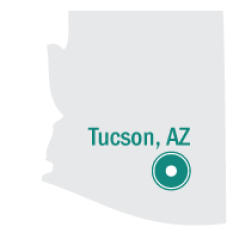Expanding Patient-Centered Cancer Care for Underserved Patients in Southern Arizona
 As a member of the Alliance, the University of Arizona Cancer Center (UACC) will work with two community partners to improve access to high-quality cancer care for underserved patients in Southern Arizona. Community partner El Rio Community Health Center (El Rio) will help train and integrate community (lay) patient navigators into UACC’s navigation program. Arizona Community Health Workers Association (AzCHOW) will collaborate with UACC to position community health workers to deliver family-focused supportive care for vulnerable cancer patients. UACC aims to expand and strengthen its current programs to improve: coordination of cancer care, provider and patient communication, and psychosocial and supportive care.
As a member of the Alliance, the University of Arizona Cancer Center (UACC) will work with two community partners to improve access to high-quality cancer care for underserved patients in Southern Arizona. Community partner El Rio Community Health Center (El Rio) will help train and integrate community (lay) patient navigators into UACC’s navigation program. Arizona Community Health Workers Association (AzCHOW) will collaborate with UACC to position community health workers to deliver family-focused supportive care for vulnerable cancer patients. UACC aims to expand and strengthen its current programs to improve: coordination of cancer care, provider and patient communication, and psychosocial and supportive care.
Cancer (most notably lung, colorectal, breast and prostate) is a leading cause of death in Southern Arizona. Individuals living in the UACC service area – a large geographical region of five Southern Arizona counties (Cochise, Pima, Santa Cruz, Pinal, Yuma) face increased cancer risks associated with age, obesity, sun exposure and heavy metal toxins arising from mining and ground water contamination.
The UACC service area includes rural, low-income, elderly and Hispanic patients who often experience substantial disparities in access to cancer treatment. They also face numerous obstacles to receiving timely cancer care, such as: traveling long distances for care, limited access to primary care providers and specialists and language barriers.
OUR INTERVENTION APPROACH
Improve coordination of cancer care and integration with primary and other specialty care
- Expand UACC’s existing patient navigation program by adding culturally appropriate, bilingual lay navigators to guide and support vulnerable patients through the entire process of cancer care and treatment
- Partner with El Rio to incorporate trained, bilingual community lay patient navigators into UACC’s navigation program
- Develop and deliver post-treatment care plans (known as cancer survivorship care plans) to all eligible cancer survivors at the appropriate time in their care journey
- Better connect cancer survivors to primary care providers (PCPs) and ensure that PCPs have access to the survivorship care plans for their patients
Strengthen provider and patient communication
- Expand UACC’s communication training for health care providers, including University of Arizona medical students, to teach them how to identify and avoid bias as well as improve verbal and nonverbal communication with their patients
- Improve providers’ verbal communication and behavioral skills when interacting with diverse patients
Address supportive care and psychosocial needs of underserved patients and families
- Expand efforts to screen for depression in UACC cancer patients
- Extend the Collaborative Oncology Project to Enhance Depression Care (COPE-D) to help address symptoms of depression among vulnerable patients
- Collaborate with AzCHOW to expand access to the Un Abrazo Para La Familia (“Embracing the Family”) program, which delivers family-based and culturally appropriate supportive care to underserved patients and their families
PROGRAM PROFILE VIDEO
PROGRAM DIRECTOR
 Heidi A. Hamann, Ph.D.
Heidi A. Hamann, Ph.D.
Associate Professor
Department of Psychology
Department of Family and Community Medicine
University of Arizona Cancer Center
University of Arizona
Email: heidihamann@email.arizona.edu